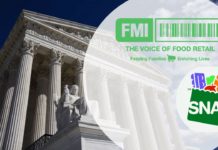The Supplemental Nutrition Assistance Program (SNAP) received some positive thrust this past month as the U.S. Department of Agriculture, the controlling agency that oversees SNAP, launched a huge new initiative for residents of New York State. For those citizens who rely on SNAP, they can now use their Electronic Benefits Transfer (EBT) cards to purchase groceries over the internet from Amazon, Walmart and even ShopRite. I wrote about this new test initiative many months ago and it has finally been launched. The SNAP pilot test program will soon be expanded to Alabama, Iowa, Nebraska, Oregon and Washington State and also even in our Food World/Food Trade News region to include Maryland and New Jersey.
Many see this new pilot program as the first step in bringing SNAP online nationwide! The initiative to bring the pilot to life actually germinated from the 2014 Farm Bill which carried language to roll out the test program. It took five years of review and analysis to launch the pilot as technical challenges had to be addressed such as verification processes, fraud prevention as well as wrongful payments. But finally, it is here.
A sidebar note: USDA has notified states to urge them to adopt tougher policies to bar individuals who fail to make child support payments from obtaining SNAP benefits. States have always had an option to take a harder position on “deadbeat” parents, but few states did so simply because it risked cutting food access for low-income individuals. So, we will have to monitor this issue to determine how states react.
WIC Negatives
The SNAP program and the special Supplemental Nutrition Program for Women, Infants, and Children (WIC) provides federal grants to states for supplemental foods, health care referrals, and nutritional education for low-income pregnant, breastfeeding, and non-breastfeeding postpartum women, and to infants and children up to age five who are found to be at nutritional risk. The problem is that WIC participation is on the decline.
Politico reported last month that data from the USDA’s Economic Research Service shows that participation in the WIC program continues to decrease, a trend that began in 2018. The decline has alarmed food banks and anti-hunger groups whose mission is to help those in need get nutritious foods. Last year 6.9 million people per month participated in WIC – a 6 percent decline over the prior year. And for the prior eight years, participation also declined. To turn the decline around, the Food Research & Action Center recommended the WIC program be expanded by modernizing technology, improving shopping experiences, and increasing recruitment of families to participate in the WIC program. USDA is also aggressively speaking with WIC directors from all across the U.S., and participants and even retailers to seek ideas and suggestions for reversing the participant decline.
Food Sustainability & Climate Change
A coalition of more than 300 organizations concerned about climate change and food sustainability signed a letter to Congress supporting the Green New Deal. The letter specifically targets the role of traditional agriculture, and in particular animal agriculture, in the climate change crisis. The coalition supported legislation to reduce methane production, the consumption of animal products and the promotion of plant-based foods. It was immediately and strongly criticized by traditional agriculture and livestock interests. It is but the latest chapter in what looks like a long and bitter fight on the role of agriculture in the environment and nutrition.
And on the same day that the coalition letter was sent to Congress, the Sustainable Food Policy Alliance, made up of four major food companies- Mars, Danone, Nestle and Unilever, which you recall dropped their memberships in the Grocery Manufacturers of America (GMA) because of a difference of opinion on this and other legislative issues – released their own climate policy principles. These included a carbon pricing system, accelerating innovation in development and deployment of renewable energy and incentives for agriculture and forestry to reduce their greenhouse gas emissions. It’s interesting to note that three of the four food companies in the Alliance are European. If this topic of climate change is a bit boring, we at Policy Solutions think the issue promises to be another major debate topic in the next federal election cycle.
In case you doubted me, the issue has already cropped up for political election debates. New York Mayor Bill de Blasio, who is now the 23rd and counting, announced candidate for president, has unveiled his own “Green New Deal” climate plan with a goal to cut emissions by 30 percent by 2030. The plan includes phasing out purchases of processed meats and reducing beef purchases by 50 percent.
Voluntary Product Recalls
FDA is seeking public and stakeholder comments on draft guidance for the food industry on how to prepare for voluntary recalls of FDA regulated products. The guidance instructs companies in the supply chain to prepare a written plan or designate a team to oversee recalls and to draft boilerplate notices beforehand to accelerate notifying the public of recalls. I mentioned the product recall process in my column several months ago as recalls impact the vast majority of food chains. Repeating another word to the wise: do all you can now to ensure that your food safety staff has the tools necessary to adequately handle product recalls BEFORE they happen so you will have a formal plan of action in place!
Mandatory COOL For Beef
Last month the Washington Post published a major story in its Sunday Business Section that caught my eye. The article reported that R-CALF, a protectionist group of cattle ranchers concentrated in the Northern Plains and Western U.S., has launched a last ditch, long shot lobbying effort to include mandatory country-of-origin labeling (COOL) for beef in the legislation implementing the USMCA trade agreement between the U.S., Mexico and Canada. Muscle cuts of beef are excluded from the current COOL labeling laws and the ranchers argue that the new trade agreement threatens their future because it favors multi-national corporations that dominate the meatpacking industry. From the prospective of Policy Solutions LLC, the major reason their efforts stand a slim chance of success is because U.S. COOL labeling laws for beef have been ruled unlawful by the World Health Organization (WHO). A second reason it is a long shot is that Canada, Mexico and the largest U.S. rancher association, the National Cattlemen’s Beef Association, are opposed.
Beef Industry Sustainability
Meatingplace News reported that major players in the beef industry, including producers, retailers and veterinarians, have signed onto the new beef industry sustainability framework, prepared by the U.S. Roundtable for Sustainable Beef. The framework contains six “high priority indicators” aimed at saving the environment — water resources, land resources, animal health and wellbeing, employee health and wellbeing, efficiency and yield and greenhouse gas emissions.
DPI Food Specialty Show
A final note. I had the privilege of attending the May DPI Specialty Food Show in Baltimore. While it was great to see so many old friends, what intrigued me was the advent of new and exciting products coming to the marketplace such as Tasty Bite brand Indian madras lentils and bombay potatoes and so much more new, innovative, easy to prepare products. No wonder busy folks, especially younger adults, are not spending lots of time in food stores these days and relying on home delivery. Innovation and change. That’s what it is all about. One just had to depart the Baltimore Hilton with a smile and parting words: “Ain’t the food industry great or what”?
Barry Scher is associated with the public policy firm of Policy Solutions LLC and may be reached at: [email protected]




